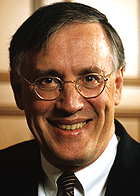Continuing education is a field that consistently sees rapid growth. In fact, the latest numbers show that the majority of total students enrolled in college courses are not in traditional programs.

Whether educating immigrants, people who didn’t have a chance to get a traditional undergraduate degree, those taking adult vocational or liberal arts classes, or seniors in programs such as the Lifelong Learning Institute in Arts & Sciences, continuing education encompasses an enormous spectrum of educational opportunities.
And now, Robert E. Wiltenburg, Ph.D., dean of University College in Arts & Sciences — the University’s continuing education arm — has been named president of the nationwide University Continuing Education Association (UCEA).
Wiltenburg will serve as president-elect from 2007-08; president from 2008-09; and immediate past-president from 2009-2010.
“It says something about the quality of what we’re doing here,” Wiltenburg said. “Washington University is seen as a leader in lots of ways.
“And although not explicitly, it’s a recognition of University College as a place that is one of the leading programs in the country. They don’t want to elect you unless they think you do this reasonably well.”
In his first year, as president-elect, Wiltenburg will have a variety of responsibilities, including traveling to the organization’s six regional meetings and doing research to determine the “sense of membership,” as Wiltenburg put it, and what issues need to be explored.
As president, he’ll take on some of the initiatives that were brought up in his previous year. Then, as immediate past-president, he’ll serve on the board of directors and assist in the search for a successor.
“I am very much looking forward to it,” he said.
Wiltenburg has been dean of University College for 10 years, and has been involved with UCEA for about eight of those years.
He served a three-year term as treasurer, sat on the executive board and chaired the finance committee.
So he’s well acquainted with the group.
“One of the things that’s nice is that, in general, we don’t compete with each other,” Wiltenburg said, alluding to the fact that continuing education programs don’t usually draw from the same pool of students. Most continuing education students live in the vicinity of the school or program and don’t relocate.
“Because of that, it is possible to be completely frank about your successes and failures, to be as helpful as possible because you know we are all believers in what we are doing for society and for the individuals,” he added.
“It’s one of the most delightful professional experiences one could have,” he said.
Wiltenburg will be the second dean from WUSTL to serve as UCEA president. John B. Ervin, dean of University College from 1968-1977, served as president of UCEA from 1975-76. The first African-American dean at the University, Ervin is honored in a display in January Hall, home of University College.
Founded in 1915, the Washington-based UCEA has about 460 member institutions, 1,800-2,000 professional members who work at the various institutions and about 36 international affiliated universities.
Member institutions include public and private accredited colleges and universities and nonprofit organizations with a commitment to continuing higher education.